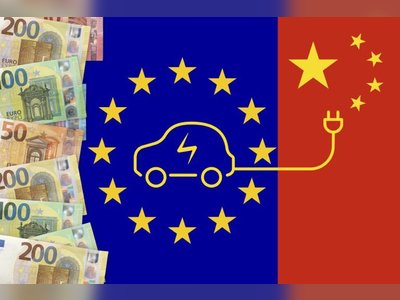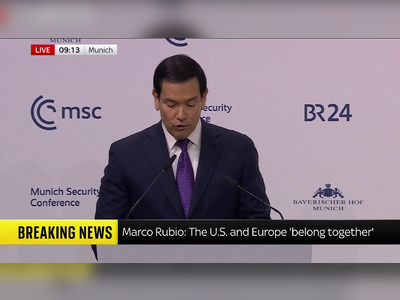
Belgian king prepares to hand his daughter the curse of the crown
For a mosquito, any blood will do the job. Royal or not.
Mosquitos pop up everywhere when night falls in the capital of the Democratic Republic of the Congo, even in glamorous five-star hotels that host kings and queens. So when Belgian King Philippe briefed reporters about his first visit to the country, he clutched a bottle of anti-mosquito spray in his hands — almost as a reminder that he too was a human being made from flesh and blood.
In theory, it was a moment when the king could relax. He and his wife, Queen Mathilde, had spent the previous week touring their country’s former colony, navigating a political and diplomatic minefield as he sought to improve ties with a country that Belgium had once subjected to some of the worst abuses in African colonial history.
He had shaken hands and patted children’s heads and held lively discussions with Congolese youth and civil society and helped put the spotlight on the victims in the country’s war-torn east. So on his final evening in the country, all he should really have had to think about was not getting stung by a mosquito.
Except, it wasn’t.
For a king, briefings with reporters — even when they are informal and not to be quoted — just open another minefield. Every sentence, every movement, every look is dissected and analyzed. Whenever the royal couple enters a room, the atmosphere changes. No one ever acts normal in the presence of a king.
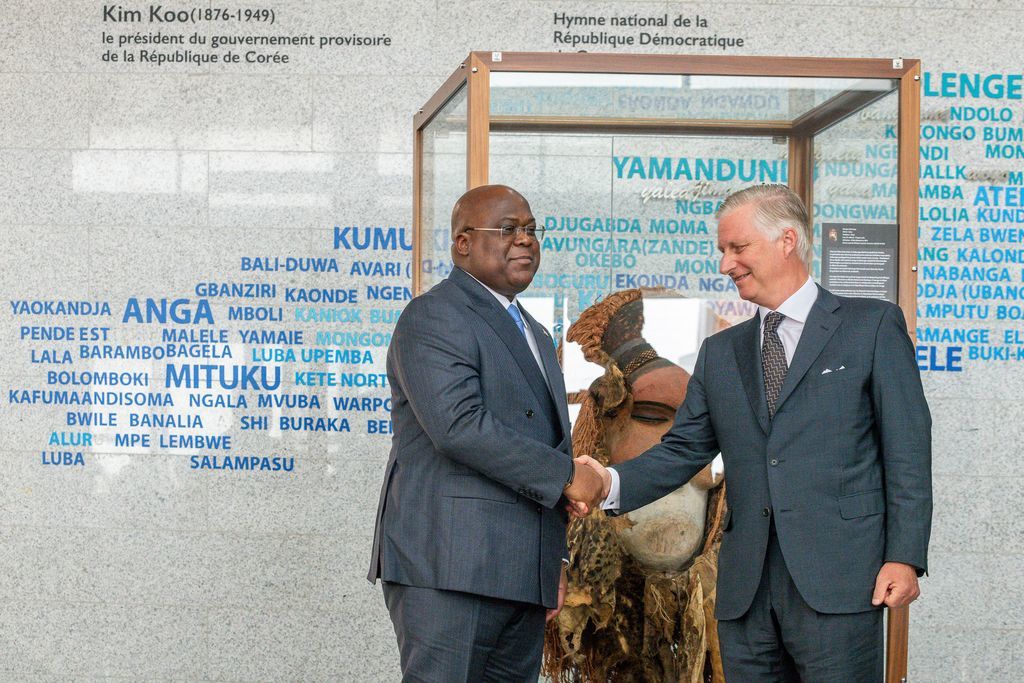 Belgium’s King Philippe (R) shakes hands with President of the
Democratic Republic of the Congo Felix Tshisekedi (L) as he hands over a
ceremonial mask during a ceremony at the National Museum of the
Democratic Republic of the Congo in Kinshasa
Belgium’s King Philippe (R) shakes hands with President of the
Democratic Republic of the Congo Felix Tshisekedi (L) as he hands over a
ceremonial mask during a ceremony at the National Museum of the
Democratic Republic of the Congo in Kinshasa
“Being born into a royal monarchy can just as much be seen as a curse than as a blessing,” said Mark Van den Wijngaert, a (now retired) specialist in royal history at KU Leuven. “You have to abide by certain rules for which you never chose.”
For Philippe, the downside of royalty has been famously painful. Though the 62-year-old monarch only ascended to the throne nine years ago, his discomfort about living under the public gaze has marked the entirety of his life.
He was mocked in the years before his father’s abdication for his rigid public appearances, at one point prompting the grand marshal in charge of the royal court to quip that “he just can’t do it.” Belgian media questioned his fitness to govern, and royal observers pointed to his difficult childhood; he was the oldest son of a difficult marriage, and by dint of his position was not permitted to take decisions on his education or future.
SPONSORED
Since donning the crown, Philippe has by all accounts acquitted himself; but as his public appearances in Congo demonstrated, he continues to wear his royalty with a sense of unease. These days, he has yet another reason for discomfort. While he has accepted his life under the public gaze, Philippe has taken pains to shield his four children from its glare. But there’s one child he won’t be able to protect.
There’s no indication he’s planning to step down anytime soon, but Philippe is already prepping his eldest, Crown Princess Elisabeth, to take his place. And things are moving quickly. Where the international royalty press has mostly paid little attention to Philippe, it can’t seem to get enough of his 20-year-old daughter.
That will be especially apparent on Belgian National Day on July 21 — a public holiday marking the investiture of the country’s first king in 1831 — when the royal family traditionally oversees the military parade. With Elisabeth having recently made her first solo appearance as a member of the royal family, the focus is ever less on the king, and more on his eventual successor.
My kingdom for a king
Being born as prince or princess may sound like a fairytale — but it can also play out as a tragedy. (In the words of one British columnist, “being born a royal is a sophisticated form of child abuse.”) Movie stars are subject to the same attention, but most of the time they’ve sought it. Royals are born into it, and even when they try to escape it, it follows them. (Just ask Harry and Meghan.)
And so, in a time when kings and queens no longer rule empires or lead armies, but visit children’s hospitals and inaugurate military ships, it also raises the question: What exactly is the point?
Without a kingdom or a country, a king is just a man; a queen, just a woman. But in an age of democracies and republics, why do some countries still think they need monarchs? If the cost of royalty is that it robs monarchs of a piece of their humanity, what (aside from the obvious life of luxury) is on the plus side of the ledger?
Throughout history, kings and queens have always bridged the gap between humans and the gods, said Walter Weyns, a sociologist at the University of Antwerp. They may no longer lord over their subjects, but in times of uncertainty and unraveling, they help hold the nation together. They visit the survivors of floods or terrorist attacks, bringing comfort to people in pain.
It’s exactly in times of crises that a monarch becomes important, said KU Leuven’s Van den Wijngaert. Think Belgian King Albert rallying his army against the invading Germans in World War I, or then-British Princess Elizabeth enlisting during World War II to help boost the morale. “The worse the politics get, the more people look up to the king,” Van den Wijngaert said.
It’s no coincidence that in Belgium, with its linguistic and political divisions, the politicians calling loudest for the end of the monarchy are those who want to break their region away from the rest of the country. Along with the national Red Devils football team, the royal family is one of the few things providing a sense of national unity.
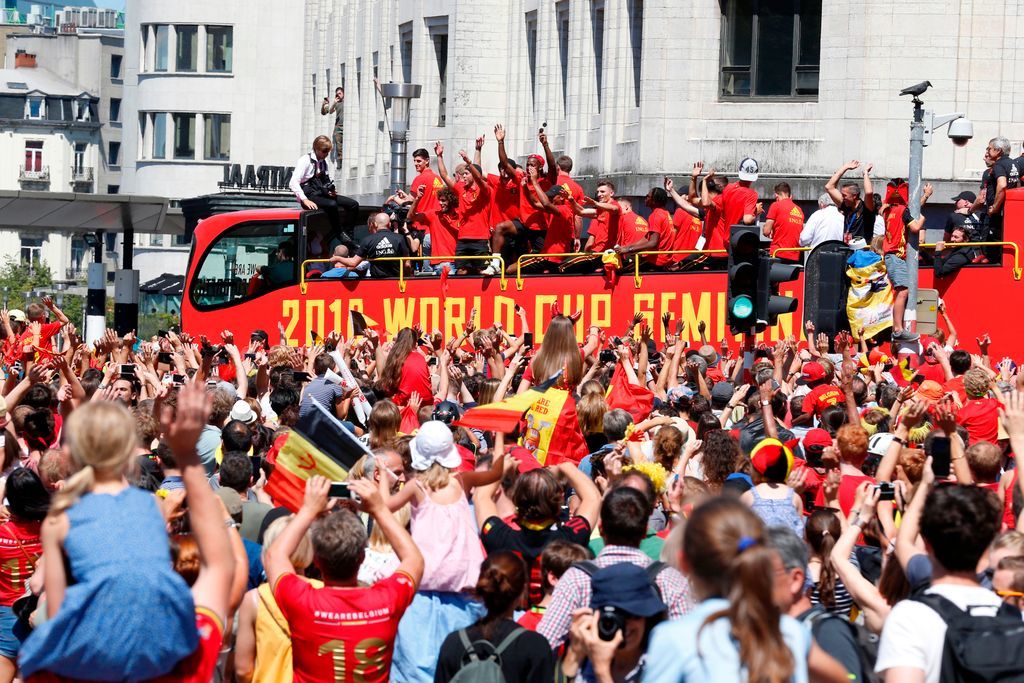 Supporters cheer as an open bus with the Red Devils pass by on their way
to the Grand Place, Grote Markt in the city centre of Brussels, as
Belgian national football team Red Devils arrives to celebrate with
supporters at the balcony of the city hall after reaching the
semi-finals and winning the bronze medal at the Russia 2018 World Cup
Supporters cheer as an open bus with the Red Devils pass by on their way
to the Grand Place, Grote Markt in the city centre of Brussels, as
Belgian national football team Red Devils arrives to celebrate with
supporters at the balcony of the city hall after reaching the
semi-finals and winning the bronze medal at the Russia 2018 World Cup
Internationally too, kings and queens still have a role to play. Critics of the monarchy dismiss it as a relic of an outdated past, an echo of the courtly excess of figures such as France’s Marie Antoinette. But when it comes to opening doors, that’s exactly the point.
“A small country like Belgium has to play its trump cards whenever it can,” is how Belgian Prime Minister Alexander De Croo, who also often accompanies members of the royal family abroad, put it during Philippe’s trip to Congo. Philippe also played an important role in convincing Alibaba’s founder Jack Ma to open a logistics hub in the deindustrialized city of Liège.
Indeed, it’s often the countries lacking royals that are the most fascinated by them. When Belgian Princess Astrid visited Texas a few years back, a Republican businesswoman sighed to her that “she had always dreamed of being a princess.”
In Asia, there is no better way to open doors for businesses than to take along a royal, said Pieter Timmermans, CEO of the Federation of Belgian Enterprises. He has accompanied members of the royal family on economic missions for well over a decade. “It’s simple: They open doors for our companies which would otherwise remain closed,” he said.
‘Unacceptable’ upbringing
Then there’s the public spectacle part of the job. As anybody with a television knows, royals have become subjects of entertainment, figures of showbusiness, said Mario Danneels, who has been covering European royalty for two decades.
“Look at what a royal wedding or a royal baby does with a nation,” said Weyns, the sociologist. “Royals may live in castles, but they are also people who face love, disease or death. That is a form of comfort for ordinary people.”
Some monarchs have embraced this aspect of the job (the Dutch queen goes skydiving, the Danish crown prince dived into the water to help save a giant bluefin tuna). While the palace is keen to show Philippe sweating when he runs through Brussels or breaking the waves as he kitesurfs on the North Sea, the king still struggles with the more formal aspects of the job, often coming across a bit stiff or uncomfortable.
The discomfort goes back to his childhood. Philippe’s parents, King Albert II and Queen Paola, had a troubled marriage and were largely absent from his upbringing. The child psychiatrist Peter Adriaenssens has called Philippe’s upbringing “unacceptable, something that would justify the intervention of social workers.”
Because he was a future king, Philippe was transferred from a French language school in Brussels, where he was purportedly happy, to a secondary school in Flanders, where he found it difficult to make friends. “In my youth, I had many problems at school,” Philippe told a group of teenage dropouts in 2019. “I felt badly treated. It was not easy for me”
In many ways, Philippe has been a very modern king. He has opened up the gates of the Royal Palace by hiring a modern communications staff, attempted to address his country’s brutal colonial history and recognized a half-sister fathered by Albert II during an extramarital affair the former king had long denied.
But when it comes to his four children, Philippe and Mathilde have done their best to shield them from the public spotlight, to allow them to grow up and live their lives normally, an official in the king’s entourage said.
Danneels, the royalty reporter, remembers how Belgian media got hold of images of Prince Gabriel, the second child, playing a hockey tournament. They were unremarkable pictures, showing Gabriel playing sports with his friends. Nevertheless, the palace was furious.
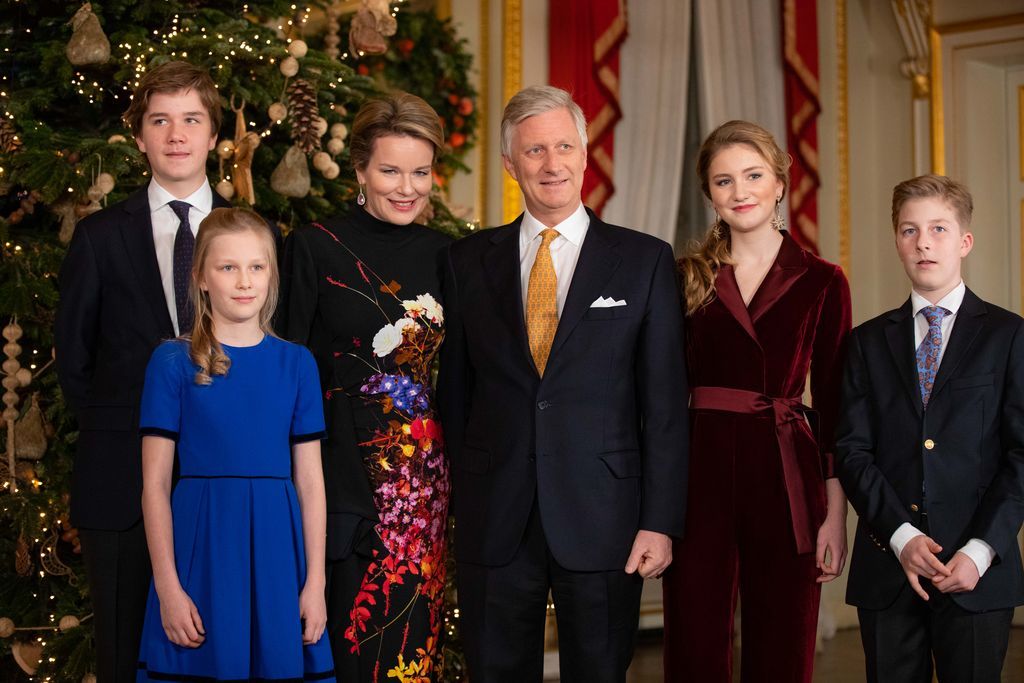 Prince Gabriel, Princess Eleonore, Queen Mathilde, King Philippe of
Belgium, Princess Elisabeth and Prince Emmanuel attend the Christmas
Concert at the Royal Palace on December 18, 2019 in Brussels, Belgium
Prince Gabriel, Princess Eleonore, Queen Mathilde, King Philippe of
Belgium, Princess Elisabeth and Prince Emmanuel attend the Christmas
Concert at the Royal Palace on December 18, 2019 in Brussels, Belgium
Next in line
So far, Philippe’s attempts to shield his oldest daughter Elisabeth from an excess of criticism has been successful. The question is how long that will last. “Philippe will do everything in his power to make sure she is thoroughly prepared for the throne,” said Van den Wijngaert.
Like Philippe, Elisabeth has grown up under the eye of the cameras (and her bodyguards). As a toddler, she was told to smile and shake hands because she would be doing that “for the rest of her life.” At the age of 9, she opened a children’s hospital that carried her name. At the age of 12, she addressed the nation in the three official languages. Her 18th birthday was broadcast live on television, in what was described as a commercial for the monarchy.
But it’s only in recent months that she has fully stepped out into the spotlight. In June, she made her official introduction into the European royalty circuit to celebrate the 18th birthday of the Norwegian princes Ingrid Alexandra, together with Dutch Crown Princess Amalia (Ingrid Alexandra suggested they create a WhatsApp group to share their experiences).
So far, the attention on Elisabeth has been overwhelmingly positive. When the palace released a picture of her working out in leggings made by the Belgian fashion brand RectoVerso, the company’s website exploded. Vogue has dubbed her one of the most stylish princesses, comparing her to Kate Middleton.
To spot — or maybe imagine — a hint of the discomfort that plagues her father requires close attention: a tense smile, her pulling her hair behind her ear a few too many times. But it’s also clear she has yet to grow completely into the job.
In Congo, when Queen Mathilde, wearing white stilettos, was invited into a children’s farm in an elementary school, she didn’t hesitate to step into the mud to help the kids feed their chickens. At a recent event in Ghent, Elisabeth wore a similar pair of shoes as she inaugurated a Belgian research ship. She then gingerly walked down the gangplank, clutching tight to guide ropes.
As any modern royal knows, there were millions who would have been delighted to see her slip.



